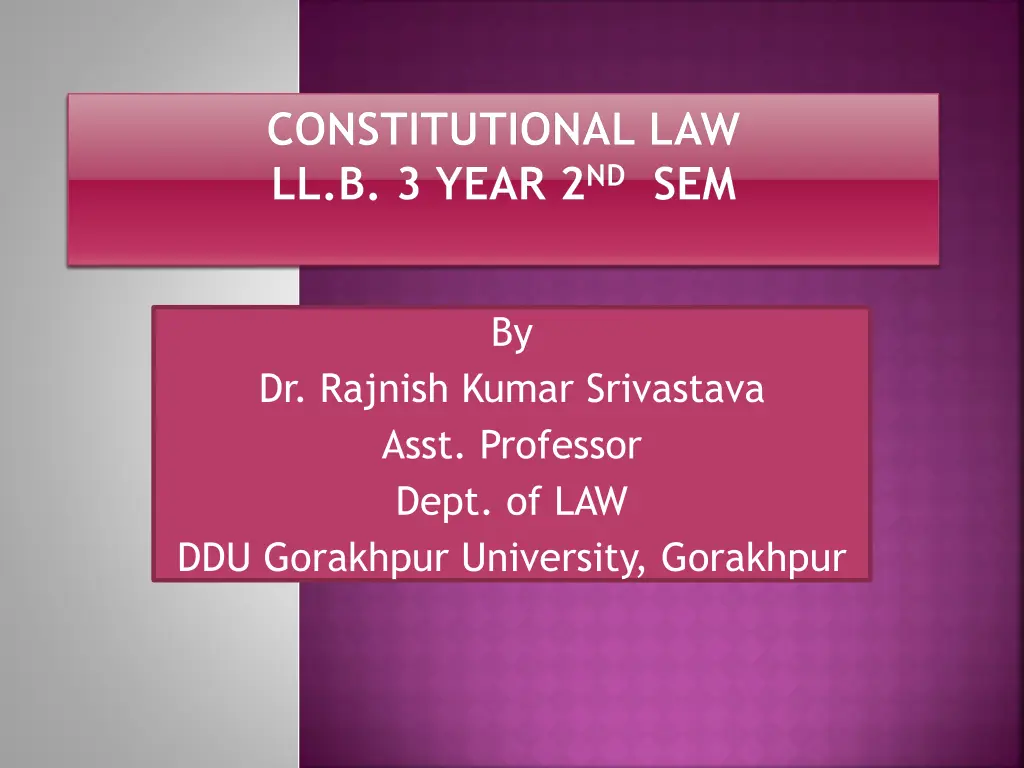
Constitutional Law LL.B. - Prohibition of Discrimination and Exceptions
Explore the key aspects of Article 15 in Constitutional Law LL.B., including the prohibition of discrimination against citizens based on religion, race, caste, sex, or place of birth. Delve into the exceptions under Article 15(3) allowing for special provisions for women and children, as highlighted in landmark cases like Anjali Roy v. State of W.B. and Dennision v. Union of India. Gain insights into the legal interpretations and implications of these provisions in upholding equality and addressing discrimination.
Download Presentation

Please find below an Image/Link to download the presentation.
The content on the website is provided AS IS for your information and personal use only. It may not be sold, licensed, or shared on other websites without obtaining consent from the author. If you encounter any issues during the download, it is possible that the publisher has removed the file from their server.
You are allowed to download the files provided on this website for personal or commercial use, subject to the condition that they are used lawfully. All files are the property of their respective owners.
The content on the website is provided AS IS for your information and personal use only. It may not be sold, licensed, or shared on other websites without obtaining consent from the author.
E N D
Presentation Transcript
CONSTITUTIONAL LAW LL.B. 3 YEAR 2NDSEM By Dr. Rajnish Kumar Srivastava Asst. Professor Dept. of LAW DDU Gorakhpur University, Gorakhpur
PROHIBITION OF DISCRIMINATION AGAINST CITIZENS Article 15 titled as prohibition of discrimination on grounds of religion, race, caste, sex or place of birth , contains provisions application of the general principle of equality of treatment embodied in article 14. of particular
EXCEPTION OF ARTICLE 15(1) AND (2) Realising that absolute equality may itself be a cause article 15(3) was included as the first exception to article 15(1) and 15(2). for inequality,
ARTICLE 15(3) Nothing prevent the state from making any special provision for women and children. in this article shall
SPECIAL PROVISION FOR WOMEN AND CHILDREN Article 15(3) is an exception to the rule against discrimination embodied in clause (1) as well as clause (2) while, both these clauses prohibit discrimination ground of sex, clause (3) enables the state to confer special rights upon women and children. on the
ANJALI ROY V. STATE OF W.B. AIR 1952 CALCUTTA 825 The word for in clause (3) signifies that special provisions can be made in favour of women and children not against them. Therefore, clause (1) to clause (3) of together would imply that State can discriminate in favour of women and children against men, discriminate in favour of men against women and children. and article 15 read but cannot
DENNISION V. UNION OF INDIA AIR 2009 (NOC)2540 (MAD.) SC 123 The Court said that the provisions of Protection of Domestic Violation giving preferential treatment to wife over husband in as much as under the Act husband cannot file any application, have been upheld as in tune with Article 15(3) and not violation of Article 14 or 16. Women Act, from 2005,
VIJAY LAKSHMI V. PUNJAB UNIVERSITY AIR 2003 SC 3331 A reservation for appointment of lady principal in women s college or a lady teacher therein does not violate Article 14,15 and 16. The State Government is empowered to make provisions under Article 15(3) of the Constitution and it is not restricted in any manner by Article 16. rule providing preference or such special
RAJESH KUMAR GUPTA V. STATE OF U.P. AIR 2005 SC 2540 In this case it was held by the court that reservation of 50 per cent of posts in favour of female arbitrary. candidates is non-
THE CONSTITUTION (73RDAMENDMENT) ACT,1992 AND THE CONSTITUTION (74THAMENDMENT) ACT,1992 These amendments 243-D and 243-T to the Constitution, making provisions for reservation of not less than one third of the total seats for women in the constitution of the Panchayats Municipalities, respectively. added Article and the
THE PROPOSED CONSTITUTION (84THAMENDMENT) BILL, 1998 This provisions for the reservation of 33 per cent of seats for women in the composition of Lok Sabha and the Legislative Assemblies of the States. proposed bill contains
